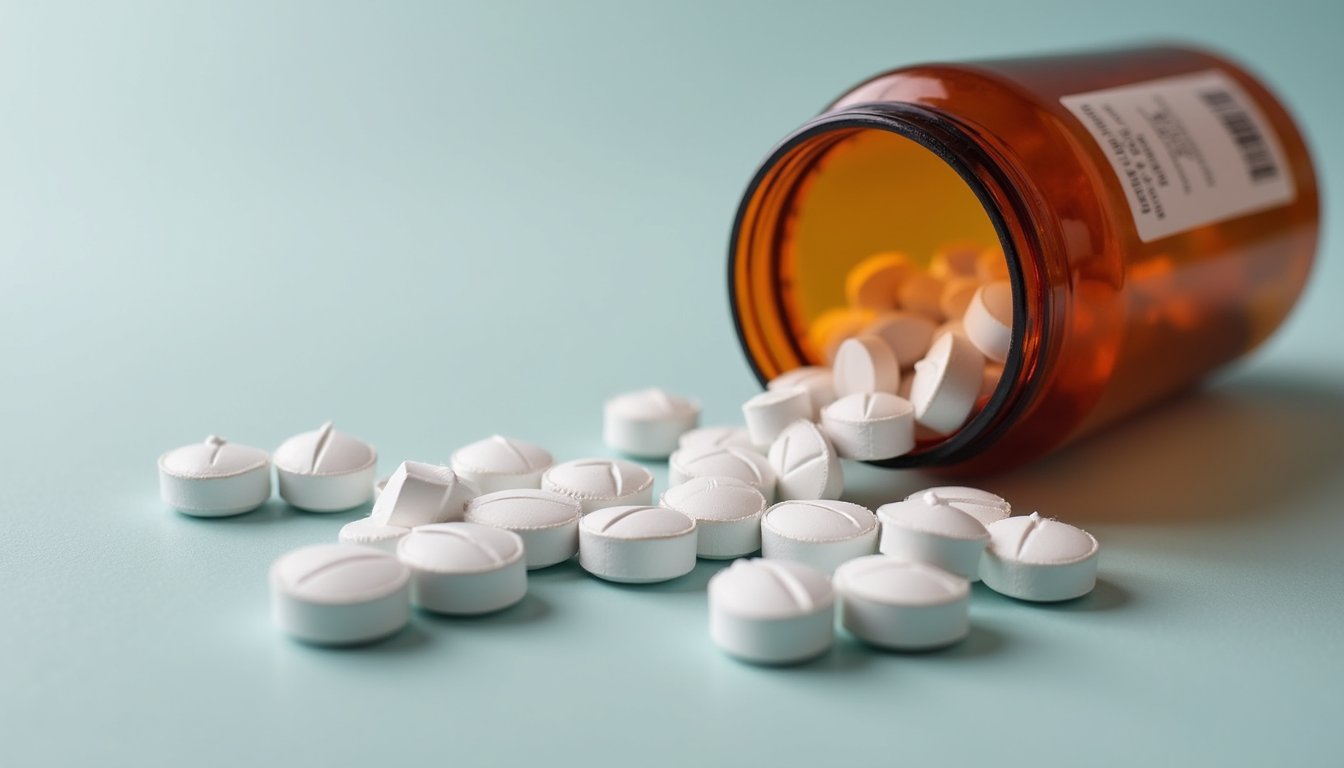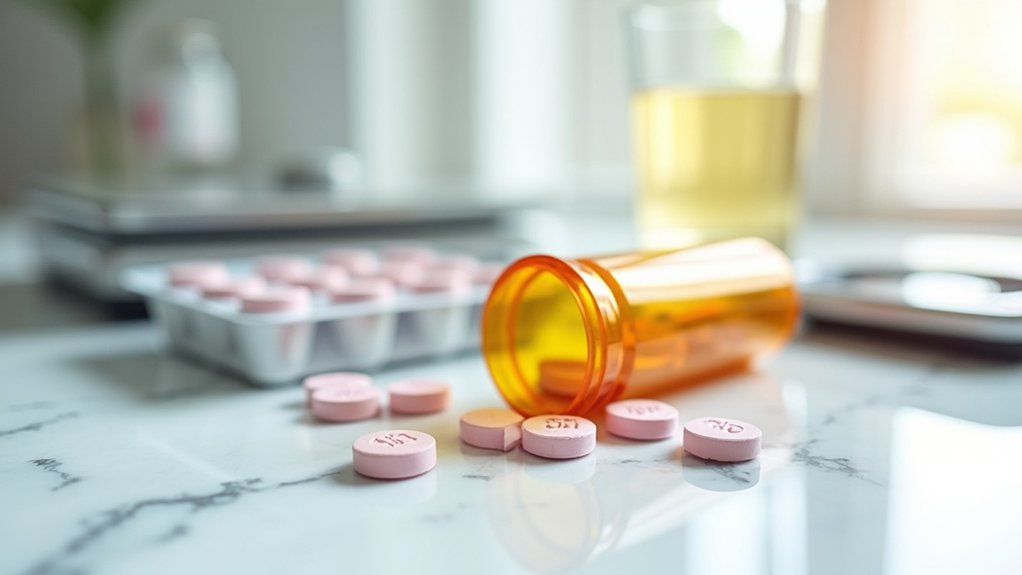Yes, Abilify effectively treats schizophrenia through its unique dopamine-serotonin system stabilizing mechanism. Clinical trials show response rates of 42-53% among patients, with up to 74% achieving remission on long-term treatment. You’ll find it manages both positive and negative symptoms while causing fewer side effects than typical antipsychotics. The medication maintains effectiveness for up to two years, with 88.5% fewer hospitalizations in five-year studies. Understanding its proper dosing and administration can optimize your treatment outcomes.
Understanding How Abilify Works for Schizophrenia

While many antipsychotic medications work by simply blocking dopamine receptors, Abilify (aripiprazole) takes a more nuanced approach through its unique mechanism as a dopamine-serotonin system stabilizer. The drug’s partial agonist activity at D2 receptors enables modulation of brain networks in a bidirectional manner, helping to balance both excessive and insufficient dopamine activity. Clinical studies show that Abilify typically reaches steady-state concentrations within 14 days of starting treatment. Clinical evidence indicates that Abilify has been FDA approved since 2002 for treating schizophrenia in adults.
You’ll find that Abilify’s pharmacokinetic properties allow it to work differently in various brain regions. It reduces dopamine activity in the mesolimbic pathway to address positive symptoms like hallucinations, while potentially increasing dopamine in the mesocortical pathway to improve negative symptoms. This targeted strategy, combined with its effects on serotonin receptors (5-HT1A and 5-HT2A), creates an extensive treatment approach for managing schizophrenia symptoms. Unlike typical antipsychotics that can cause significant motor problems, Abilify’s unique pharmacological profile results in fewer extrapyramidal side effects.
Clinical Evidence Supporting Abilify’s Effectiveness
Multiple double-blind clinical trials have confirmed Abilify’s substantial effectiveness in treating schizophrenia symptoms, with proven response rates at doses between 10-30 mg per day. You’ll find strong evidence showing Abilify improves positive and negative symptoms while demonstrating lower rates of side effects compared to first-generation antipsychotics. Long-term studies verify that you can expect sustained symptom control with Abilify, as it shows high treatment persistence rates above 79% and considerably delays time to relapse versus placebo. Recent research spanning two years shows patients maintain functional improvements while taking Abilify, with sustained positive outcomes in social and occupational abilities. As a dopamine receptor stabilizer, Abilify works differently from other antipsychotics to help regulate dopamine activity in the brain. In a major 12-week study, patients receiving Abilify showed a significant PANSS reduction compared to those on placebo, demonstrating clear improvement in psychotic symptoms.
Proven Response Rates
Clinical trials demonstrate Abilify’s significant effectiveness in treating schizophrenia through robust response rates and symptom improvements. You’ll find response rates ranging from 42-53% among patients taking Abilify, with success defined by a 50% or greater reduction in PANSS scores. The medication shows particularly strong symptom stabilization, with 74% of patients achieving remission on the 441mg dose during long-term treatment. Studies show optimal treatment outcomes occur when serum levels reach 150-300ng/ml.
Your chances of maintaining functional improvements are enhanced by Abilify’s high retention rates, with up to 73% of patients completing their full 52-week treatment course. The drug effectively treats both positive and negative symptoms, demonstrated through significant reductions in PANSS subscale scores. Clinical data confirms that you’re likely to experience better outcomes with Abilify compared to placebo, with accentuated lower relapse and hospitalization rates.
Long-Term Symptom Management
Research demonstrates Abilify’s robust long-term effectiveness in managing schizophrenia symptoms, with studies showing sustained improvement in global functioning for up to two years under aripiprazole once-monthly treatment. The medication’s partial agonist activity makes it uniquely effective for controlling symptoms while minimizing side effects.
Clinical data confirms Abilify’s symptom durability across the entire spectrum of schizophrenia, including complex cases with comorbidities. The medication maintains stable or improving PANSS scores and CGI-S ratings beyond 12 months, with remission rates reaching 68-74% during year-long treatment courses. Those who completed the full five-year treatment showed an impressive 88.5% reduction in hospitalizations. You’ll find compelling evidence of functional improvements, as patients show enhanced social and occupational capabilities while maintaining treatment.
Long-term studies reveal Abilify’s superiority in preventing relapses and reducing hospitalizations compared to oral antipsychotics. The injectable form particularly excels, with persistence rates of 82.4% in real-world settings, leading to sustained symptom control and fewer emergency interventions.
Proper Dosage and Treatment Methods

Your doctor will typically start you on an oral Abilify dose of 10-15mg once daily for adult schizophrenia treatment, while adolescents begin with a more gradual titration from 2mg to 10mg over 5 days. If you’re having difficulty with medication adherence, you might be prescribed injectable options like Abilify Maintena (400mg monthly) or Abilify Asimtufii (960mg every two months). Whether taking oral or injectable forms, you’ll need periodic monitoring to confirm the lowest effective dose is maintained, as higher doses generally don’t provide additional benefits.
Starting Dose Guidelines
Starting treatment with Abilify requires careful attention to proper dosing guidelines, which vary between adults and adolescents with schizophrenia. For adults, you’ll begin with 10-15 mg once daily, while adolescents aged 13-17 follow a more gradual titration schedule starting at 2 mg/day.
Your doctor will manage dosage adjustments carefully, as increases shouldn’t occur before two weeks in adults to reach steady state. For adolescents, adjustments happen more frequently, reaching 10 mg/day by day five, with subsequent 5 mg increases up to 30 mg/day as needed. You can take your medication with or without food, but it’s crucial to maintain consistency. While the maximum recommended dose is 30 mg daily for both groups, research shows that doses above 15 mg don’t necessarily provide increased benefits.
Injectable Vs Oral Options
When considering treatment options for schizophrenia, both injectable and oral formulations of Abilify offer distinct advantages in managing symptoms. Your doctor will help determine which option best suits your needs based on factors like treatment convenience and symptom stability requirements.
Injectable Abilify presents several key benefits over oral administration:
- Once-monthly dosing at 400mg (or 300mg if needed) considerably improves treatment convenience compared to daily oral doses
- Better adherence rates lead to reduced relapse risk and fewer hospitalizations
- Long-acting formulation maintains more consistent medication levels, supporting sustained symptom stability
While oral Abilify (10-30mg daily) remains effective for many patients, the injectable version may be particularly beneficial if you’ve experienced challenges with medication adherence or prefer monthly administration. Both formulations demonstrate similar efficacy in controlled studies, though injectable options show superior outcomes in real-world settings. The medication functions as a unique dopamine-system stabilizer, helping to balance neurotransmitter levels in the brain more effectively than traditional antipsychotics.
Managing Side Effects and Safety Concerns
Managing Abilify’s side effects calls for careful monitoring and proactive intervention strategies. You’ll need regular metabolic profile evaluations to track potential changes in blood sugar, weight, and lipid levels. It’s vital to report any new compulsive behaviors, as impulse control monitoring is essential during treatment. Patients should be aware that uncontrollable urges typically stop within days to weeks of dose reduction.
Common side effects you might experience include headaches, anxiety, and gastrointestinal issues. More serious concerns require immediate medical attention, particularly symptoms of Neuroleptic Malignant Syndrome or tardive dyskinesia. If you’re using injectable forms, expect potential injection site reactions. Compared to older antipsychotic medications, Abilify shows lower tardive dyskinesia risks. Taking oral aripiprazole consistently helps maintain lasting stability and reduces the risk of symptom reemergence.
Your healthcare provider should closely monitor you for cerebrovascular events, especially if you’re elderly. For maximum safety, report any unusual movements, mood changes, or new behavioral patterns promptly. Special attention is needed if you’re pregnant or breastfeeding, as the medication can affect infants.
Long-Term Benefits and Treatment Outcomes

Research demonstrates that long-term Abilify treatment yields substantial benefits for schizophrenia management, particularly through its long-acting injectable formulations. Clinical evidence shows significant improvements in long term functional outcomes and quality of life improvements, with retention rates reaching 73% for the 441mg dose over one year. Notably, over 73% of patients who achieved remission maintained this improvement through the remainder of the study.
Key long-term benefits include:
- Sustained symptom control with PANSS score reductions and CGI-S improvements maintained through 52 weeks
- Enhanced treatment adherence, with only 9.7% discontinuing due to tolerability issues
- Improved Global Assessment of Functioning (GAF) scores over two years, benefiting both early- and late-phase patients
You’ll find these benefits translate into reduced hospitalization rates and better community integration, regardless of your illness duration. The medication’s effectiveness in preventing relapses supports stable, long-term recovery and improved daily functioning.
Comparing Abilify to Other Antipsychotic Medications
While many antipsychotic medications effectively treat schizophrenia, Abilify’s unique pharmacological profile sets it apart from conventional options. As a partial agonist, it offers comparable effectiveness to other atypical antipsychotics while potentially reducing certain side effects. You’ll find Abilify demonstrates similar efficacy in symptom control and relapse prevention compared to medications like risperidone and olanzapine. However, the limited quality evidence from clinical trials makes it challenging to draw definitive conclusions about its comparative effectiveness. Research shows an overall dropout rate of 38.5% in comparative trials.
When considering comparative cost effectiveness, Abilify’s lower risk of metabolic complications and reduced need for combination therapy with antiparkinsonian drugs may offset its expense. The medication’s diverse formulation options, including oral tablets, solutions, and long-acting injections, provide flexibility in treatment planning. While you might experience more akathisia with Abilify, you’ll likely encounter fewer problems with weight gain, sedation, and movement disorders compared to alternatives like Seroquel or haloperidol.
Latest Research and Medical Guidelines
Recent clinical trials and meta-analyses have substantially expanded our understanding of Abilify’s effectiveness in treating schizophrenia. The research highlights Abilify’s unique partial dopamine agonist mechanism, which addresses both compliance challenges and comorbid medical conditions more effectively than traditional antipsychotics.
Key findings from current medical guidelines and research demonstrate:
- Long-acting injectable Abilify (AOM 400) shows superior relapse prevention with rates of only 10% compared to 36.9% for placebo
- The QUALIFY study reveals significant quality of life improvements for patients under 35, with benefits emerging at week 8
- Clinical trials confirm enhanced social functioning and working memory through improved prefrontal dopamine transmission
These evidence-based outcomes have positioned Abilify as a frontline treatment option rather than a last resort intervention.
Frequently Asked Questions
Can I Drink Alcohol While Taking Abilify?
You shouldn’t drink alcohol while taking Abilify. Current alcohol consumption guidelines strongly advise against mixing these substances due to dangerous interactions. You’ll face increased risks of severe potential side effects, including extreme drowsiness, dizziness, and impaired judgment. The combination can also reduce Abilify’s effectiveness and strain your liver. If you’re currently drinking while on Abilify, consult your healthcare provider to discuss safer alternatives.
How Long Does It Take for Abilify to Start Working?
You’ll typically notice Abilify’s initial effects within the first week of treatment, particularly at dosages of 20-30mg daily. However, the full therapeutic benefits usually develop over 2-4 weeks. Your onset time may vary based on your individual metabolism, illness severity, and dosage requirements. While you might experience early symptom improvements, your doctor will likely evaluate your full response at 4-6 weeks to verify you’re getting ideal benefits from the medication.
Will Abilify Affect My Ability to Drive or Operate Machinery?
Yes, Abilify can affect your ability to drive and operate machinery, especially when you first start treatment. You may experience drowsiness, concerns with alertness, and impaired coordination that could make these activities dangerous. Don’t drive or use heavy machinery until you know how the medication affects you personally. You’ll need to monitor your response and discuss any side effects with your healthcare provider to determine when it’s safe to resume these activities.
Can I Suddenly Stop Taking Abilify if I Feel Better?
No, you shouldn’t stop taking Abilify suddenly, even if you’re feeling better. Abrupt discontinuation can trigger severe withdrawal symptoms and increase your risk of psychotic relapse. You’ll need to work with your healthcare provider to create a safe tapering schedule for dosage adjustments. Stopping without medical supervision can lead to nausea, anxiety, insomnia, and symptom recurrence. Always maintain regular contact with your doctor to evaluate your treatment needs and discuss any medication changes.
Does Abilify Interact With Birth Control Pills?
You don’t need to worry about potential Abilify birth control interactions, as research shows no significant interaction between Abilify and most common oral contraceptives. Abilify doesn’t affect your birth control’s effectiveness, and birth control pills don’t impact Abilify’s function in your body. They’re safe to take together, and you won’t need backup contraception. However, if you’re using less common contraceptive formulations, it’s worth discussing with your healthcare provider to confirm safety.





